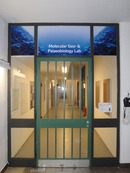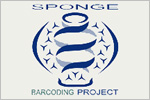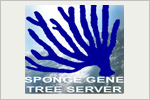Molecular Geo- and Palaeobiology Lab

The laboratories of Molecular Geo- and Palaeobiology are equipped for molecular analyses in genome and proteome research. The core of this unit comprises four S1-certified molecular laboratories with a total of 23 bench places distributed over 130 square metres laboratory area:
- an S1 Research laboratory
- an S1 Teaching lab
- an S1 Laboratory for sample preparation
- an S1 Sequencing & Geomicrobiology lab
These laboratories are equipped with an Illumina MiniSeq benchtop sequencer, a Bioanalyzer 2100, a Rotor-Gene Q (qPCR) thermal cycler (QIAGEN), a gentleMAC dissociator (miltenyibiotec), a 10x Chromium Controller, four Biometra thermal cyclers, spectrometers, fluorometers, and various other instruments for standard molecular analysis including genomics, proteomics, and (single cell-)transcriptomics. S1 infrastructure includes autoclave, sterile benches, UV crosslinker, ultrapure water system and various incubators.
Two separate refrigerator and freezer rooms provide 4°C to -80°C storage space for samples.
Adjacent to the S1 laboratories is the electrophoresis room with gel documentation and darkroom.
The microscope room offers various microscopic facilities including fluorescence microscopes, stereomicroscopes and image processing. The microscope equipment includes a Leica DM LB transmitted light microscope, a Leica M165FC fluorescence stereomicroscope, a Leitz DMRP polarization microscope and a Leica Thunder Imageing System.
The histology laboratory has extensive equipment for fixation, staining and preparation of histological sections, such as a Leica RM2255 microtome and a Leica SP1600 hard section microtome.
We have been operating marine research aquariums very successfully since 2009. Three aquarium rooms offer excellent possibilities for the cultivation of marine model organisms and experimental research. The first aquarium room is equipped with a 330 l experimental tank and a 310 l tank, both on separate water circuits, and a rack with 21 x 9 l tanks. The aquariums can be individually supplied by two independent seawater systems for a variety of experiments. A second aquarium room contains four separate water circuits (1800 l, 2040 l, 1350 l and 1220 l, each system being divided into several separate tanks), including a number of smaller, mobile tanks for individual experiment set-ups.
The lab's own computing infrastructure include a Linux Cluster of 496 CPUs/Cores - 2,498 GB RAM coupled with a Galaxy server for managing complex analytical workflows in a reproducible manner, and a functional Geneious Server for standard sequence analysis.
Research Projects
Research in the laboratories focuses on evolution, genomics, proteomics, biodiversity, systematics and biomineralisation of marine invertebrates, such as sponges, echinoderms, bacterial sponge symbionts, biomineralisation of sponges, soft and hard corals, deep phylogeny of the animals and the development of bioinformatics tools. (See www.geobiology.eu).
Contact
- Prof. Dr. Gert Wörheide (head): woerheide@lmu.de
- Prof. Dr. Dirk Erpenbeck (scientific laboratory manager): erpenbeck@lmu.de
- Dr. Nora Dotzler (technician, histology laboratory): n.dotzler@lrz.uni-muenchen.de
- Dr. Peter Naumann (technician, aquaria): p.naumann@lrz.uni-muenchen.de
- Simone Schätzle (technician, molecular laboratories):s.schaetzle@lrz.uni-muenchen.de
- Linda Bichlmaier (technician, molecular laboratories):l.bichlmaier@lrz.uni-muenchen.de





